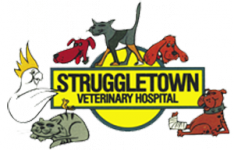Vaccinations
Vaccinations
Dogs
We routinely vaccinate dogs against 5 major infectious diseases. The vaccination schedule is as follows:
- 6-8 weeks C3
- 10 weeks C5 + leptospirosis
- 12 weeks C5 + leptospirosis
- Annual booster thereafter
Struggletown uses the most up to date vaccines giving the highest level of protection. This means we still see your dog for a full health check and vaccination annually, however the C3 component is only given once every 3 years, while the canine cough booster is given annually.
A C3 consists of protection against:
- Parvovirus: causes haemorrhagic (bloody) diarrhoea and vomiting and can be fatal, especially in young dogs.
- Distemper: causes neurological and respiratory disease.
- Hepatitis: an infectious cause of liver disease.
A Canine cough vaccinations (which makes up a C5 when added to a C3) consists of protection against:
- Bordatella: causes kennel cough which is a highly contagious cough that dogs often contract when in close contact with other dogs, for example in boarding kennels. The disease causes signficant discomfort to dogs (and their owners) but is rarely serious or life-threatening.
- Parainfluenza: a viral cause of kennel cough
Currently due to the risk in the Eastern Suburbs, Inner West & Inner Sydney suburbs (as well as the South coast and Newcastle region), the recommendation by the Australian Veterinary Association is that all puppies/dogs are also vaccinated again a disease called Leptospirosis which is transmitted and harboured by rats. This is an aggressive disease with a high mortality rate, and it can also be passed to humans. Because of this Struggletown highly recommends adding this to the usual C5 vaccine and yearly health check for all dog owners.
Update as of Dec 2024: We are now stocking the latest vaccine available for this condition which now covers more strains and is a more effective vaccine than the old one. We will be transitioning all dogs across to this vaccine who are already vaccinated when they are next due, but all puppies and any dogs who are not currently vaccinated will be started on this newer vaccine. Due to the nature of this disease, we highly recommend any adult dogs not already vaccinated against this disease (or who’s vaccine protection has lapsed) to come and see us to get up to date ASAP.
Vaccination takes about 1 to 2 weeks to stimulate immunity. If your dog was not previously vaccinated then he or she should be isolated from other dogs in this period.
Puppies: can begin socialisation one week after the 10 week vaccination. Struggletown uses a vaccination which is more effective in younger dogs than the older types of vaccinations. This is because we wish to encourage early socialisation of puppies and attendance at Puppy School.
Cats
Cats are vaccinated routinely with an F3 vaccination against 3 core feline diseases, but also optionally can be given an FIV vaccination (Struggletown highly recommends this vaccine for any cat that goes outdoors and potentially contacts other cats).
The kitten vaccination schedule is as follows:
- 8 weeks
- 12 weeks
- 16 weeks
Followed by an Annual booster thereafter for adult cats with a full yearly health check.
An F3 consists of protection against the following:
- Feline enteritis: a serious infection causing diarrhoea and vomiting as well as bone marrow suppression
- Calicivirus: a virus causing sneezing, ocular and nasal discharge (‘cat flu’), sometimes oral ulceration, as well as occasionally causing joint swelling and pain with fever
- Herpesvirus: also causes cat flu; in addition can cause ocular and oral ulceration. Rarely can cause a severe inflammatory skin condition
FIV and vaccination:
‘Feline Immunodeficiency Virus’ is similar to the human immunodeficiency virus in that it causes suppression of the immune system and increased susceptibility to infections. However, FIV is not transmissible to humans
The disease is contracted primarily by fighting with other cats and is more common in roaming, male cats. FIV is estimated to be present in approximately 15% of the NSW cat population. The area around Randwick is likely of higher risk than some areas due to the high number of stray and feral cat colonies close by, hence we highly recommend that owners consider this vaccine for any outdoor cats.
Many cats remain healthy while infected for many years, while others can show a wide variety of symptoms and illness within months of infections which include:
- Loss of apetite/weight loss
- Fever
- Poor coat health
- Lethargy/tiredness
- Swollen lymph nodes (glands)
- Anaemia
- Gingivitis and stomatitis (inflammation of the gums and mouth) which is sometimes very severe
- Chronic or recurrent respiratory, ocular, and intestinal disease
- Nervous system disease
- Chronic, recurrent, and sometimes atypical infections
- Higher chance of developing certain cancers
For at risk cats, there is vaccine available that has been shown to be effective at reducing the risk of infection in an Australian field study by up to 66%. For such a potentially harmful disease, why would you not vaccinate your cat to keep them safe, especially since there is currently no effective treatment for FIV.
The initial vaccination course consists of 3 vaccines 2-4 weeks apart, followed by a yearly booster.
Update as of Feb 2025: The FIV vaccine has unfortunately been unavailable in Australia for the better part of 2 years now. However, the good news is that it is NOW BACK IN STOCK!
If you have a new kitten, or an outdoor cat who has never had the vaccine, or has lapsed in vaccinations, don’t hesitate to get in touch with our friendly team to discuss whether the FIV vaccine is right for you and your cat.
Get In Touch!
Address:
148 Barker St,
Randwick NSW 2031
Contact:
(02) 9398 8000
reception@struggletownvet.com.au
Newsletter
Subscribe to our monthly newsletter
Hours:
Mon to Fri: 7:30am - 9:00pm
Sat: 9:00am - 5:00pm
Sun: 9:00am - 1:00pm
Providing Quality Vet Care Near:
Randwick, Coogee, Kingsford, Daceyville, Kensington, Bronte, Waverley, Queens Park, East Gardens, Pagewood, Hillsdale, Maroubra.
